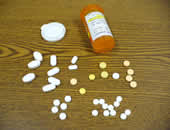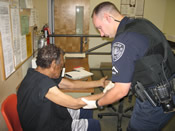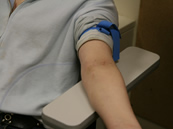Alaska Drug Evaluation and Classification Program
 Photo courtesy of Ofc. Pete Steen, BHP/AST |
 Photo courtesy of Ofc. Pete Steen, BHP/AST |
About the Alaska DEC program:
The Drug Evaluation and Classification (DEC)/Drug Recognition Expert (DRE) program is an international program intended to equip law enforcement officers with the knowledge and skills required to distinguish between impairment caused by drugs other than alcohol and impairment caused by other reasons. Furthermore, through a process of standardized and systematic observations and measurements, the Drug Recognition Expert (DRE) can classify the drug impairment as being characteristic of one or more classes of drugs.
Alaska joined the DEC/DRE program in 2004. Alaska was the 36th state to join. Currently there are 45 states, Canada, and other countries participating in this program.
Read the latest in Alaska's DEC/DRE news in the Alaska DECP Newsletter ![]() (1.6 MB)
(1.6 MB)
DEC/DRE FAQs
What is a DRE?
A Drug Recognition Expert (DRE) is a law enforcement officer who has successfully undertaken extensive training, both in the classroom and though practical experience, to be able to detemine if an individual is impaired by drugs and what class of drug or drugs is causing the impairment.
Who can become an Alaska DRE?
Any law enforcement officer in Alaska currently employed who is sponsored by his or her agency and local prosecutors’ office can apply to become a DRE.
Is DRE testimony accepted in court?
Yes, DREs have been accepted as experts in both Superior and District court in most judicial districts in Alaska.
How reliable is the DRE process?
The DRE process has been the subject of scientific scrutiny and the DRE 12-step method has been tested and found to be reliable in studies published in peer-reviewed journals. After a DRE has completed his/her evaluation of a person, a blood specimen is taken from the person and the toxicology results are compared independently to the opinion rendered by the DRE. The percentage of correctly identified drug classifications as compared to toxicology results are tracked and included in percentages of correctly identified evaluations for that DRE, his/her agency, state, and national evaluations.
Does every law enforcement agency need a DRE?
At this point, there is not a requirement or practical need to train a DRE at every agency. DRE techniques training for non-DREs is available and the DEC program goals are to make this training as widely available as possible.
Is there any DRE-related training for law enforcment officers?
Yes - DRE Instructors teach Advanced Roadside Impaired Driving Evaluation (A. R. I. D. E) courses, a 16-hour training in DRE techniques for non-DREs. In 2009, five A. R. I. D. E. training courses were held at various locations around the state and more are planned for 2010.
Can DRE methods be used outside of law enforcement agencies?
Yes- a class, similar to the A.R.I.D.E. course is available for school officials. The course, named Drug Impairment Training for Education Professionals (DITEP) is a 16-hour course taught by DRE Instructors to School Resource Officers, school nurses, administrators, and other school personnel.
DRE Certification Training and Application
DRE Initial Certification Requirements:
- Currently employed as a law enforcement officer or work in a law enforcment capacity in Alaska
- Not currently in a training or probationary status
- Sponsored by agency
- Sponsored by prosecutor’s office
- Completed and approved DRE Certification application
DRE Re-Certification Requirements, Every 2 years:
- 8 hours of classroom training
- Perform at least 4 DRE evaluations
- Submit rolling log, DRE equipment for reviw by DRE Instructor
- Successfully complete DRE evaluation supervised by DRE Instructor
DRE Instructor requirements
- DRE in good standing for 2 years
- Sponsored by agency with approval from state coordinator
A. R. I. D. E. certification
- employed by agency
- demonstrate proficiency in SFSTs
- successfully complete 16-hour training taught by DRE instructor
SFST Instructor requiements
- hold Basic SFST certificate
- sponsored by agency
- successfully complete 40-hr SFST Instructor Course
Alaska DRE Application ![]() (27 KB)
(27 KB)
DRE History
History and Development*
A DRE is a police officer who is trained to recognize impairment in drivers who are under the influence of drugs other than, or in addition to, alcohol.The International Association of Chiefs of Police (IACP) coordinates the National Drug Evaluation and Classification (DEC) Program; the National Highway Traffic Safety Administration (NHTSA) funds it.
The Los Angeles Police Department (LAPD) originated the program. In the early 1970's, LAPD officers noticed that many of the individuals they arrested for driving under the influence of alcohol registered very low or zero alcohol concentration readings.The officers reasonably suspected that the arrestees were under the influence of drugs, but lacked the knowledge and skills to support their suspicions. In response, two LAPD sergeants collaborated with various medical doctors, research psychologists and other medical professionals to develop a simple, standardized procedure for recognizing drug influence and impairment. Their efforts culminated in the develop-ment of a multi-step protocol and the first DRE program. The LAPD formally recognized the program in 1979.
The LAPD’s DRE Program attracted NHTSA’s attention in the early 1980’s. NHTSA worked with the LAPD to develop a standardized protocol, which led to the development of the DEC Program. During the ensuing years, NHTSA, other agencies and research groups examined the DEC Program. These studies demonstrated that a properly trained DRE can successfully identify drug impairment and accurately determine the category of drugs causing such impairment.
In 1987, NHTSA started DEC pilot programs in Arizona, Colorado, New York and Virginia, and added Utah, California, and Indiana in 1988. Commencing in 1989, IACP and NHTSA expanded the DEC Program across the country. Currently, 37 states, the District of Columbia, three branches of the military, the Internal Revenue Service (IRS) and several countries around the world employ the DEC Program.
*From “The Drug Evaluation and Classification (DEC) Program:”, American Prosecutors Research Institute, 2004.
Alaskan Law Enforcement Agencies Participaitng in DRE Program
DRE Statistics
2004: 2005: 2006: |
2007: 2008: 2009: |
2008 DRE Results by Drug Category ![]() (179 KB)
(179 KB)
2009 Toxicology Results ![]() (236 KB)
(236 KB)
DRE - Related Resources
National DEC/DRE Information ![]()
Governors' Highway Safety Association ![]()
National District Attorney's Association ![]()
International Association of Chiefs of Police ![]()
National Safety Council ![]()
Alaska DRE Program Contacts
![]() Capt. Barry Wilson , Alaska DEC program coordinator
Capt. Barry Wilson , Alaska DEC program coordinator
![]() Lt. Matt Soden, Northern Regional DRE agency coordinator
Lt. Matt Soden, Northern Regional DRE agency coordinator
![]() Ofc. Steve Dunn, Anchorage Police Department DRE agency coordinator
Ofc. Steve Dunn, Anchorage Police Department DRE agency coordinator
![]() Sgt. Troy Shuey, AST DRE agency coordinator
Sgt. Troy Shuey, AST DRE agency coordinator
DEC/DRE
- DEC/DRE FAQs
- DRE Certification Training and Application Process
- DRE History
- Alaska Law Enforcement Agencies Participating in DRE
- DRE Statistics
- Other DRE Related Links
- Alaska DEC/DRE Program Contacts
Safety Topics
- DEC / DRE
- Distracted Driving
- Fatality Analysis Reporting System (FARS)
- Headlights
- Media Campaigns
- Occupant Protection
- DUI Information & Impaired Driving
- Senior Driving in Alaska
- Teen Driving in Alaska
- Traffic Records





